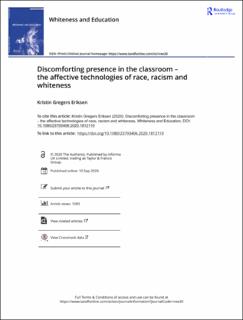Discomforting presence in the classroom – the affective technologies of race, racism and whiteness
Peer reviewed, Journal article
Published version
Permanent lenke
https://hdl.handle.net/11250/2753870Utgivelsesdato
2020Metadata
Vis full innførselSamlinger
Originalversjon
Eriksen, K. G. (2020). Discomforting presence in the classroom–the affective technologies of race, racism and whiteness. Whiteness and Education, 5(1). https://doi.org/10.1080/23793406.2020.1812110Sammendrag
This article sheds light on the elusive presence of race, racism, and Whiteness in Norwegian primary schools. Empirical examples from observations at six schools exemplify how race and racism appear as taboo concepts, but nonetheless play central roles in structuring conversations in the classroom. I argue that applying an affective theoretical lens provides access to perspectives on race, racism and Whiteness often concealed in education for social justice. This shifts the focus from who is racist, to what race, racism and Whiteness do as affective technologies in social encounters. A major implication is that the common focus on knowledge, attitudes and values in anti-racist education is insufficient for education that enhances social justice. I argue that the insights from affect theory might serve well both as analytical and pedagogical tools in approaching anti-racist education, but also face challenges when confronted with the greater imperative of decolonising education.

